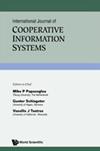Analysis of the Role of Information Systems Technology in Lecture Learning during the Corona Virus Pandemic
IF 0.8
4区 计算机科学
Q4 COMPUTER SCIENCE, INFORMATION SYSTEMS
International Journal of Cooperative Information Systems
Pub Date : 2020-08-27
DOI:10.29040/IJCIS.V1I2.15
引用次数: 16
Abstract
Abstract— At this time the spread of the Corona Covid-19 Virus was sweeping the world, Indonesia was also affected, especially in the world of education where the teaching and learning process was usually carried out face-to-face in the classroom. So as a result of this pendemi the teaching and learning process must be done online. The role of information systems technology is very meaningful in lecture learning. This study aims to analyze a model of campus learning conditions and the role of information system technology in college learning amid the COVID-19 corona virus pandemic at STMIK Sinar Nusantara Surakarta. The research method is to make observations and literature studies to obtain data and information used in research. The results of this study indicate the use of information technology has a very important role in the implementation of online distance learning in the midst of the corona covid 19 virus pandemic, among online online media such as: google classroom, whatsapp, zoom. Of the online learning media, it is proven that Google Classroom: 55.9% is widely used as media for sharing materials and assignments, while video conferences lectures are the most users of Google Meet as much as: 70.6%. The results of the analysi s of the online learning value are: 44.1%. Based on this data, it shows that the role of information system technology plays an important role and helps in the teaching and learning process amid the Covid-19 corona virus pandemic.浅析信息系统技术在新冠疫情期间课堂教学中的作用
摘要:当前,新冠肺炎疫情正在席卷全球,印尼也受到了影响,特别是在教育领域,教学过程通常是在课堂上面对面进行的。因此,由于这种流行病,教学和学习过程必须在网上完成。信息系统技术在课堂学习中的作用是非常有意义的。本研究旨在分析新冠病毒大流行期间新加坡国立理工大学校园学习条件模型以及信息系统技术在大学学习中的作用。研究方法是通过观察和文献研究来获取研究中使用的数据和信息。本研究结果表明,在covid - 19病毒大流行期间,在谷歌教室、whatsapp、zoom等在线在线媒体中,信息技术的使用在实施在线远程学习方面发挥了非常重要的作用。在在线学习媒体中,谷歌课堂:55.9%被广泛用作分享资料和作业的媒体,而视频会议讲座是谷歌见面用户最多的,高达:70.6%。在线学习价值分析结果为:44.1%。这些数据表明,在新冠肺炎大流行期间,信息系统技术在教学过程中发挥了重要作用和帮助。
本文章由计算机程序翻译,如有差异,请以英文原文为准。
求助全文
约1分钟内获得全文
求助全文
来源期刊

International Journal of Cooperative Information Systems
工程技术-计算机:信息系统
CiteScore
2.30
自引率
0.00%
发文量
8
审稿时长
>12 weeks
期刊介绍:
The paradigm for the next generation of information systems (ISs) will involve large numbers of ISs distributed over large, complex computer/communication networks. Such ISs will manage or have access to large amounts of information and computing services and will interoperate as required. These support individual or collaborative human work. Communication among component systems will be done using protocols that range from conventional ones to those based on distributed AI. We call such next generation ISs Cooperative Information Systems (CIS).
The International Journal of Cooperative Information Systems (IJCIS) addresses the intricacies of cooperative work in the framework of distributed interoperable information systems. It provides a forum for the presentation and dissemination of research covering all aspects of CIS design, requirements, functionality, implementation, deployment, and evolution.
 求助内容:
求助内容: 应助结果提醒方式:
应助结果提醒方式:


